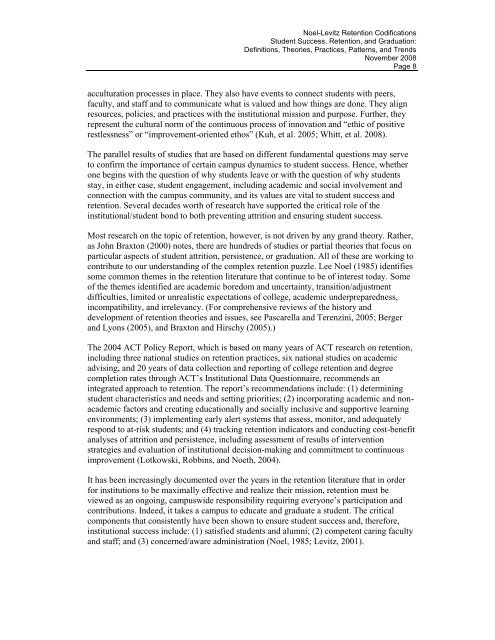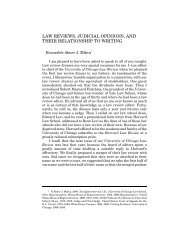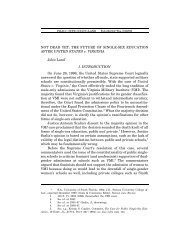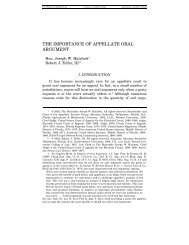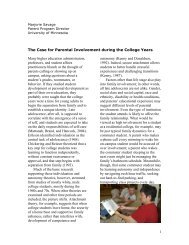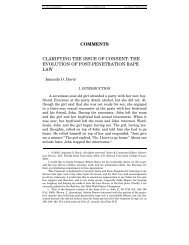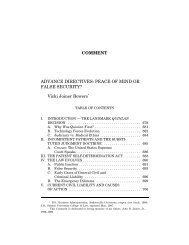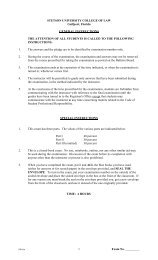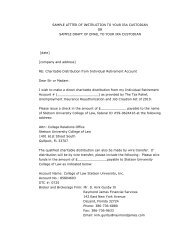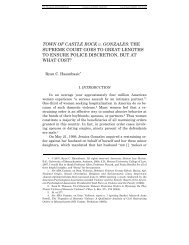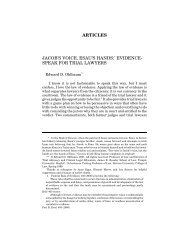Student Success, Retention, and Graduation: Definitions, Theories ...
Student Success, Retention, and Graduation: Definitions, Theories ...
Student Success, Retention, and Graduation: Definitions, Theories ...
You also want an ePaper? Increase the reach of your titles
YUMPU automatically turns print PDFs into web optimized ePapers that Google loves.
Noel-Levitz <strong>Retention</strong> Codifications<strong>Student</strong> <strong>Success</strong>, <strong>Retention</strong>, <strong>and</strong> <strong>Graduation</strong>:<strong>Definitions</strong>, <strong>Theories</strong>, Practices, Patterns, <strong>and</strong> TrendsNovember 2008Page 8acculturation processes in place. They also have events to connect students with peers,faculty, <strong>and</strong> staff <strong>and</strong> to communicate what is valued <strong>and</strong> how things are done. They alignresources, policies, <strong>and</strong> practices with the institutional mission <strong>and</strong> purpose. Further, theyrepresent the cultural norm of the continuous process of innovation <strong>and</strong> “ethic of positiverestlessness” or “improvement-oriented ethos” (Kuh, et al. 2005; Whitt, et al. 2008).The parallel results of studies that are based on different fundamental questions may serveto confirm the importance of certain campus dynamics to student success. Hence, whetherone begins with the question of why students leave or with the question of why studentsstay, in either case, student engagement, including academic <strong>and</strong> social involvement <strong>and</strong>connection with the campus community, <strong>and</strong> its values are vital to student success <strong>and</strong>retention. Several decades worth of research have supported the critical role of theinstitutional/student bond to both preventing attrition <strong>and</strong> ensuring student success.Most research on the topic of retention, however, is not driven by any gr<strong>and</strong> theory. Rather,as John Braxton (2000) notes, there are hundreds of studies or partial theories that focus onparticular aspects of student attrition, persistence, or graduation. All of these are working tocontribute to our underst<strong>and</strong>ing of the complex retention puzzle. Lee Noel (1985) identifiessome common themes in the retention literature that continue to be of interest today. Someof the themes identified are academic boredom <strong>and</strong> uncertainty, transition/adjustmentdifficulties, limited or unrealistic expectations of college, academic underpreparedness,incompatibility, <strong>and</strong> irrelevancy. (For comprehensive reviews of the history <strong>and</strong>development of retention theories <strong>and</strong> issues, see Pascarella <strong>and</strong> Terenzini, 2005; Berger<strong>and</strong> Lyons (2005), <strong>and</strong> Braxton <strong>and</strong> Hirschy (2005).)The 2004 ACT Policy Report, which is based on many years of ACT research on retention,including three national studies on retention practices, six national studies on academicadvising, <strong>and</strong> 20 years of data collection <strong>and</strong> reporting of college retention <strong>and</strong> degreecompletion rates through ACT’s Institutional Data Questionnaire, recommends anintegrated approach to retention. The report’s recommendations include: (1) determiningstudent characteristics <strong>and</strong> needs <strong>and</strong> setting priorities; (2) incorporating academic <strong>and</strong> nonacademicfactors <strong>and</strong> creating educationally <strong>and</strong> socially inclusive <strong>and</strong> supportive learningenvironments; (3) implementing early alert systems that assess, monitor, <strong>and</strong> adequatelyrespond to at-risk students; <strong>and</strong> (4) tracking retention indicators <strong>and</strong> conducting cost-benefitanalyses of attrition <strong>and</strong> persistence, including assessment of results of interventionstrategies <strong>and</strong> evaluation of institutional decision-making <strong>and</strong> commitment to continuousimprovement (Lotkowski, Robbins, <strong>and</strong> Noeth, 2004).It has been increasingly documented over the years in the retention literature that in orderfor institutions to be maximally effective <strong>and</strong> realize their mission, retention must beviewed as an ongoing, campuswide responsibility requiring everyone’s participation <strong>and</strong>contributions. Indeed, it takes a campus to educate <strong>and</strong> graduate a student. The criticalcomponents that consistently have been shown to ensure student success <strong>and</strong>, therefore,institutional success include: (1) satisfied students <strong>and</strong> alumni; (2) competent caring faculty<strong>and</strong> staff; <strong>and</strong> (3) concerned/aware administration (Noel, 1985; Levitz, 2001).


